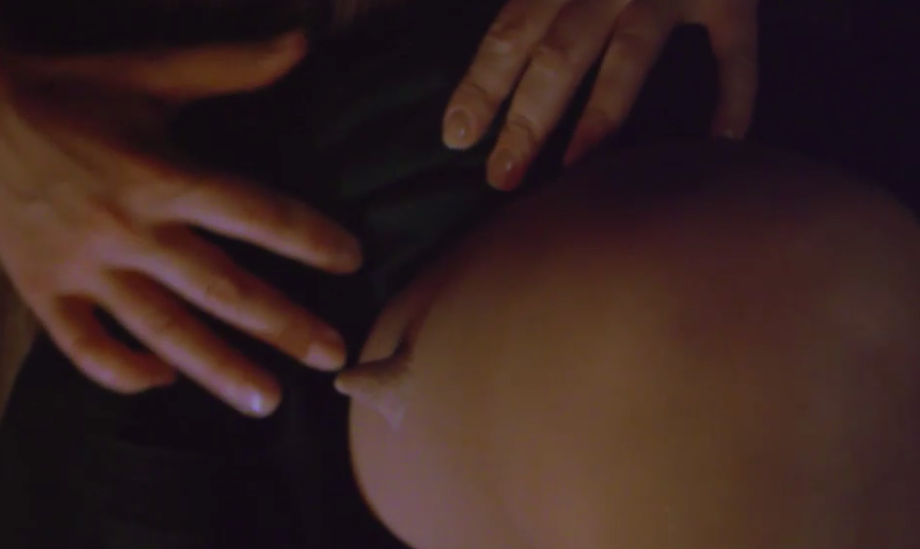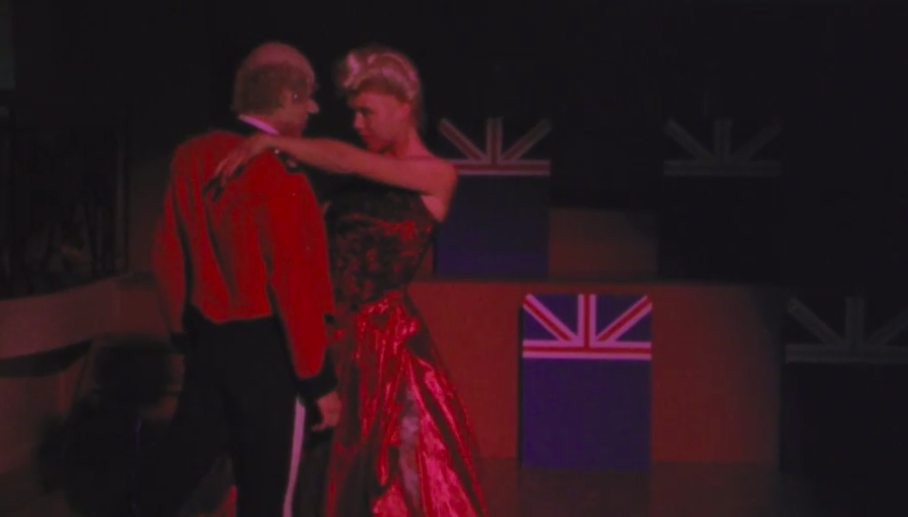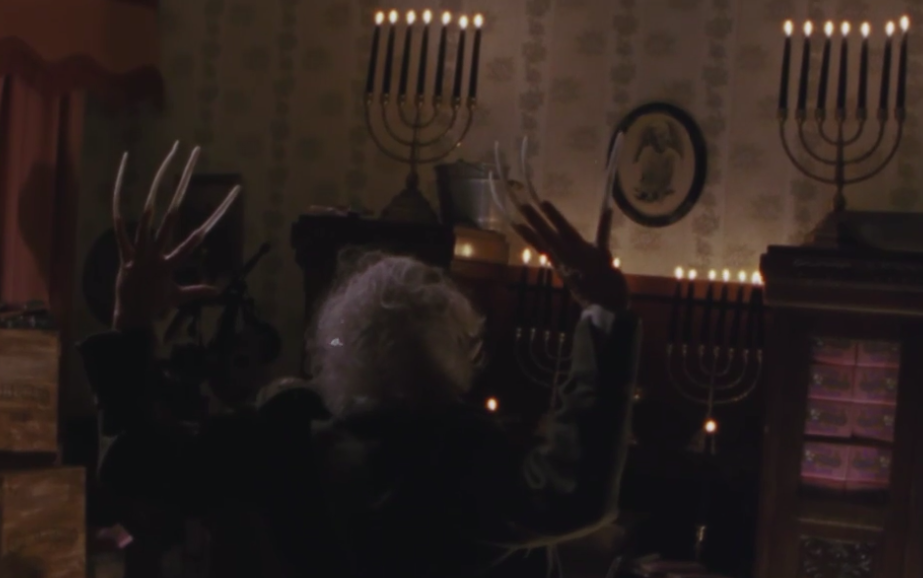Tilbury (1987)
October 13, 2022

Synopsis
During the British invasion of Iceland in 1940 (Did you know Britain invaded Iceland? I sure as hell didn't), Audun travels to Reykjavik in search of Gudrun, the local priest's daughter, who is supposedly in some kind of trouble. When he finds her he also finds she's taken up with an "ugly, impish" British soldier, General Tilbury, much to Audun's disgust. He soon suspects that the man is not what he seems and takes it upon himself to save Gudrun from this creature. Originally made for TV in 1987, it was re-released in 2021 as part of the folk horror collection associated with Woodlands Dark and Days Bewitched.
The soundtrack
I honestly didn't even notice the soundtrack with the exception of one song, which was so oddly funny that I had to mention it: There's a very dramatically-lit dance performed to the "let's all go to the lobby" song. I know it's a real song that probably has a real title, but I don't care. Let's get ourselves some snacks.
The cinematography
For the most part it's nothing to write home about; pretty disappointing considering how beautiful the Icelandic landscape is. The only moments of note are Audun's recurring memory-dream-vision of Gudrun and another girl, and the ballroom dance. These scenes are both oozing with Twin Peaks energy. But guess what? I hated Twin Peaks, so aside from these scenes looking good and being the only real moments of noteworthy style in the movie, I don't really have anything else to say.

Language & accessibility
If you're watching on Shudder and reliant on captions you may want to skip this one. The dialogue frequently switches between Icelandic and English, but only the Icelandic has captions. Apparently the movie's gotten a DVD release thanks to Woodlands Dark and Days Bewitched so maybe it's better there, but I can only evaluate the Shudder version.
The characters and story
So apparently Britain invaded Iceland? It was a """""precautionary measure""""" to keep the Nazis from taking it, and what started as about seven hundred soldiers swelled to thirty-fucking-thousand with the combined Allied forces. The whole thing is equal parts fascinating and infuriating to read about, but of interest to us is this: those thirty thousand troops accounted for 25% of Iceland's total population at the time, and 50% of its men.
Why is that relevant? Because according to Icelandic folklore, when times are tough (In other words, when you're living in pre-industrial Iceland), women could summon up an entity called a tilberi to help alleviate poverty and starvation. This being would steal milk from your neighbor's cows and then vomit it up for its owner in the form of...green butter. In exchange, the tilberi feeds off the woman- it's unclear whether it's blood, some kind of milk, or perhaps her life essence- from a nipple that appears on her inner thigh.
You know what else happens when times are tough? Women make difficult decisions for their survival.
Women dating, marrying, or selling their bodies to invading forces is nothing new, and it makes sense: wars tend to devastate the local economy, landscape, food supply, and of course, pool of marriage-age men. Iceland may not have been an actual combat zone, but the invasion was still a gigantic upheaval of Icelandic society. People flocked to Reykjavik in droves for work, and young women's marriage options suddenly expanded beyond "marry a fisherman" or "marry a farmer." Given the choice between some local rube and foreign soldiers with money, chocolate, exotic accents, and enough free time to party, it's easy to understand why Gudrun ran away and then rebuffed Audun.
A Letterboxd review (that for the life of me I can't find now) pegged this movie as an exploration of men's anxieties about women's sexuality, and I agree completely. When the tilberi is sucking on the thigh-nipple it's depicted as a pleasurable experience for the woman, and while it would obviously be pretty upsetting to see what you believe is a supernatural creature sucking on your crush's inner thigh, the two times Audun witnesses this happening is when he's most upset. His rage at the sight of Gudrun receiving impure pleasure from the tilberi is what causes her death, and he refuses to accept his culpability, instead insisting that the British soldiers killed her.
Chocolate
Chocolate is all over this movie. When Audun and Tilbury first encounter one another, Tilbury gives him a chocolate bar. Bardi threatens to expose Gudrun when he discovers she's been filling Cadbury chocolate bars with tilberi butter, and her apartment is full of chocolate. As the movie is closing out, there's an awkward, over-long scene with an American soldier (general?) throwing Hershey bars very weirdly at some children as his features change to resemble Tilbury. Chocolate being a regular consumer good, as opposed to a luxury good, is one of the bigger deals of the past century and if you ever read a positive account of soldiers interacting with kids you're likely to see mention of chocolate bars. I can't speak to the Icelandic relationship to chocolate (though I did have some delicious sweets in Iceland) but I think it's safe to say the chocolate bars in this movie aren't just chocolate bars. They're a symbol of comfort, simultaneously simply and luxurious, and the soldiers freely giving them out to struggling women and children is a very simple representation of the better life they represent. Why would Gudrun stay in her village and marry some dirt farmer when she could eat chocolate in her own apartment filled with gifts?
Sure, the chocolate does represent something more insidious, particularly with regard to the children: It's easier to forgive an immoral and unlawful invasion of your home when the people doing it have sweets and a smile. When I was watching it I joked that the candybars were a metaphor for the sugar industry coming in and ruining traditional diets and ways of life and after some thought, I actually don't think I was too far off the mark. It's probably not literally Big Sugar (although...), but a symbol for industrialization and consumerism. For good or ill, Iceland modernized pretty rapidly after this, and if Audun is a stand-in for the traditional Icelandic way of life then it's easy to see why he's so anxious around the British.
The gross stuff
So...this movie got some antisemitism issues.
It's a pretty common talking point that the typical features of some fantasy and folklore creatures are rooted in antisemitism; making "Jewish features" monstrous or otherwise inhuman in a subtle way that continues into modern day. I've also seen the opposite argued; that goblins, for example, have entirely independent origins. Iceland was pretty isolated for most of its history so maybe their folklore wasn't tainted by antisemitism, but this movie was made in the 1980s, and perhaps more importantly, is set during World War II. All this to say: I'm pretty confident that General Tilbury's appearance is rooted in antisemitism. I don't see how it could be interpreted as anything but caricature. And what a caricature: the man barely looks human, even when he isn't vomiting green butter.
There's also this:

According to...uh, this guy, the director claims the menorahs were "just an element of set decoration that carried the potential for misinterpretation and not confirmation of a character’s earlier accusations," which...okay, maybe? I'm not going to call the director a liar, but...it's weird, right? The four (4!) menorahs are right there.
A generous interpretation is that the movie is intentionally trying to show how gross and bigoted these kinds of statements are. We're led to believe that Gudrun is the one who denounced Bardi to the Brits, and Audun does seem dismissive of him, possibly because he's a Nazi, but we don't ever get any real pushback against the Nazi talking points introduced. The movie does nothing to address these issues, and instead uses Jewish imagery as the centerpiece for the murderous finale.
That's all bad enough on its own, but add to that the whole "invaders coming in and stealing our women" angle. This is still a white supremacist talking point, right now in the year 2022, and the idea that it's being supported, funded, and/or planned by Jewish people is too. Nowadays it's being used mostly in service of Islamophobia and anti-refugee rhetoric, but make no mistake: """""White genocide""""" and """""Great Replacement""""" shit is just reworded Nazi talking points and always has been.
Closing thoughts
Without all that context, considering it's a made-for-TV movie with seemingly no budget, Tilbury is pretty okay, and even fun at times. The practical effects are cheesy and mostly terrible and the plot meanders wildly through nonsense scene after nonsense scene. It's a funky, wild little ride. If not for the more...unfortunate aspects of the production, my biggest complaint would be that the tilberi lore is really glossed over.
When I was first sorting through my thoughts about this movie I wasn't sure if it was innocently exploring folklore and just happened to have some clumsy moments, or if it was intentionally and blatantly pushing a hateful agenda. I still don't know for sure. Either this movie is operating on a level of satire that I simply can't grasp, the director is a liar, or the director needs to do some serious soul-searching.
Content warnings
Antisemitism. Duh.